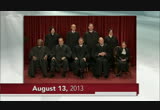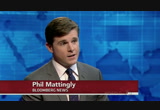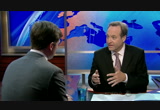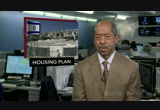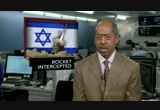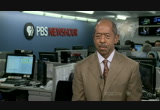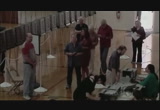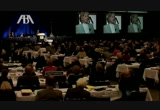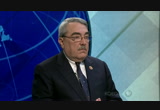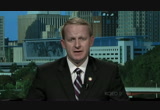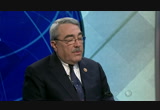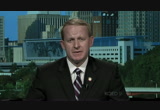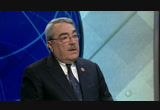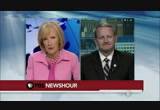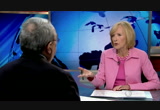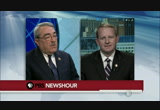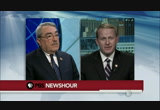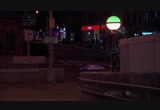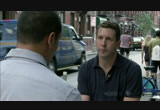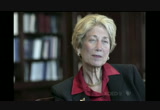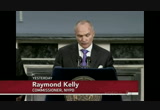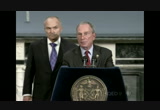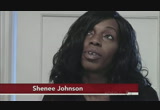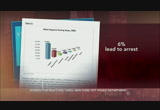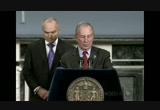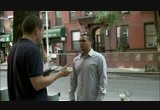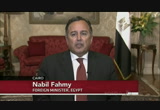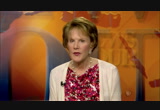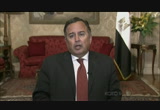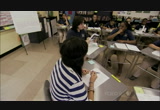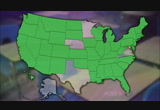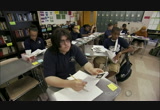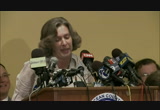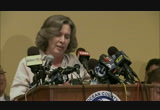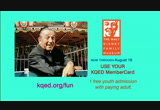tv PBS News Hour PBS August 13, 2013 3:00pm-4:01pm PDT
3:00 pm
caioning sponsored by macneil/lehrer productions >> woodruff: the merger between american airlines and u.s. airways hit some turbulence today. the u.s. justice department and several state attorneys general are suing to block the deal. good evening. i'm judy woodruff. >> brown: and i'm jeffrey brown. on the newshour tonight, the surprise legal challenge claimed the merger would increase air fares and cut services. we explore the fight over creating the world's largest airline. >> woodruff: then, north carolina joined a growing list of states to pass a voter i.d. law. we debate the measure, the first since a landmark ruling on voting rights by the supreme court. >> brown: new yorkers weigh the pros and cons of the city's stop and frisk policy. we get reaction to a judge's order to limit the program. >> woodruff: despite dire
3:01 pm
warnings, egypt's government has yet to crack down on mass- protests supporting the ousted president. margaret warner talks with egypt's foreign minister. >> brown: new education standards taken up by many states outline what kids should learn but not how. john merrow looks at teachers and students adjusting to "the common core." >> with mathematics, it used to be this is how you do it, here are your steps, if you don't do it that way, you're wrong. now the common core says do it any way you want, just be able to do it and justify your answer. >> woodruff: and luck strikes 16 maintenance workers in new jersey. we hear from the group who recently won a big lottery jackpot. that's all ahead on tonight's newshour. >> major funding for the pbs newshour has been provided by: ♪ ♪
3:02 pm
moving our economy for 160 years. bnsf, the engine that connects us. >> and the william and flora hewlett foundation, working to solve social and environmental problems at home and around the world. >> and with the ongoing support of these institutions and foundations. and... >> this program was made possible by the corporation for public broadcasting. and by contributions to your pbs station from viewers like you. thank you. >> brown: the u.s. department of justice moved today to block the latest and largest merger in the airline world. it means the deal joining
3:03 pm
american airlines and u.s. airways may be grounded permanently. ( laughter ) it was all smiles and backslaps six months ago as the airlines' c.e.o.s announced plans to merge. >> this really is about taking two airlines, putting them together and providing better service to our customers. our view is, it increases competition, doesn't decrease competition. >> brown: but today, the justice department said it will hurt competition. justice, and attorneys general from six states plus the district of columbia, filed suit in federal court to ground the $11 billion merger at the 11th hour. the department said such a merger would leave just three so-called "legacy" carriers and make flying more expensive. the "new american" would have been the world's largest carrier, dominating some u.s. domestic markets. at washington's reagan national airport, it would control 69% of the space and 63% of the routes. in a conference call with
3:04 pm
reporters, assistant attorney general william baer said the merger would "substantially lessen competition." he labeled the deal "pretty messed up; it's bad for consumers." for its part, a.m.r., the parent company of american said in a statement: employees, creditors and shareholders of the two airlines, plus the european union, had already okayed the deal. and the justice department did approve a series of earlier deals, including delta's acquisition of northwest in 2008, united's merger with continental in 2010, and southwest airlines' purchase of air tran a year after that. phil mattingly is covering the story for bloomberg news and joins me now. phil, this came as a surprise at least for those of you following this. >> exactly. look at the marketplace. u.s. airways down 13% today,
3:05 pm
a.m.r. down in over-the-counter trading. we spoke to some analysts who were rating this a 99% chance this deal would approved and there's a reason. there's really no precedent for the justice department to step in. as was mentioned, we've had a series of big merger deals consolidations in this industry. i don't think anybody expected this. >> brown: tell us about the reasoning of the justice department. what specifically did they say would make this anticompetitive? >> the antitrust chief had a call with reporters, he said one, this is going to increase fares, increase the fees that i think frustrate everybody on bags, leg room, that sort of thing, but it will lead the airlines to decrease service in some specific areas. most importantly, i think when you look at u.s. airways, they have a program they've been utilizing where they look to deliberately undercut these legacy airline, the three airlines they compete with on one stop flights, trying to undercut nonstop flights. they're saying there's no more
3:06 pm
economic rationale if this deal goes through for u.s. airways to cut that program. >> brown: we're talking about d.o.j., department of justice, but states and the district of columbia, what are they arguing? >> there's state interests here. you look at hubs, direct flights, you have texas which, oddly enough in the last couple weeks, has not been the greatest friend of the justice department. their attorney general was happy to get on board on this. obviously dallas being the headquarters. so what you have is you have state interests, you've got jobs, prestige and states really see this as an opportunity to get on board and block something that will have a negative impact on their state economy. >> brown: part of the reasoning from justices saying that these two are big and strong you have no go it alone in spite of what they themselves say, i guess, right? >> right. it's an interesting statement because american airlines, obviously, is coming out of bankruptcy right now. actually, in 48 hours they're supposed to introduce their reorganization plan for approval in new york. >> brown: the timing is quite interesting. >> very interesting.
3:07 pm
but something to think about over the last couple quarters, even after a decade of big losses, the airline industry has done great, and that includes american airlines and usair both with records numbers over the last couple quarters. >> brown: as we said and you repeated, the department has approved a number of big mergers in the last few years so today how are they differentiating this one from those? >> it's interesting, bill bear, the chief of the antitrust division, said we look at each case on a deal-by-deal basis. however, we looked at -- while they were doing this, during the investigation they looked back at the deals that have led up to this one, that have led up to the current consolidation and what he said was basically we have found this marketplace to be anticompetitive right now. so while they might not be regretting those deals or trying to look back and set new precedent, they are deciding those deals, while they might have thought they were okay at the time, have led them to become a major problem for this current merger. >> brown: it's interesting because they're saying "yes, we
3:08 pm
allowed those, those were fines but no more now because of the world that's been created because of those." >> and analysts are trying to figure if this is the new paradigm. with we shifting from a time where these mergers because of the good of the industry the justice department was happy to let these go through? generally very quick with few changes if any at all. are we to the point where mergers are done? this is one merger too many? >> brown: american says it's going to appeal. what does that mean? what happens next? >> well, we know the process is is that these guys have been in the room, both companies and the justice department, have been in the room for the months leading up to this kind of presenting their proposals, their arguments. what american airlines said today through their statement through a.m.r. is they said this is going to court now. they feel good, i think u.s. airways also had a statement out where they were saying this delays things for a bit but we feel good. companies have come throug this before. now, there's a couple of issues that come up. one is the justice department says they want this in court, they believe the best interest is to stop this. this also sets them up from a negotiating perspective to maybe take out certain parts, require
3:09 pm
changes to this deal, require concessions before they allow this going forward. >> brown: so it could still go forward. in the meantime, the airlines, consumers and travelers, what, status quo? >> pretty much. so consumer advocates thrilled with this. they've been pointing to the consolidation in the marketplace saying this is playing a big role in those bag fees everybody hates. they're thrilled right now. in terms of the big changes, are we going to see when you go online at kayak.com are you going to see big changes? not at the moment. i think both airlines feel like they've got a good argument that this is a pro-competitive merger that would actually bring down prices. we'll see if the justice department agrees. >> brown: let me ask you briefly. you cover department of justice. how does this decision fit into any larger antitrust strategy that you watched over the last few years? it is a surprise in that context or does it fit? >> it's interesting. the division at the justice department is under new leadership. over the last eight months they've got a new head. it's aggressive, veteran
3:10 pm
gentleman in bill bear, he's got a lot of experience and while he really is kind of complemented around the legal arena for being fair, everybody almost to a person says he's aggressive and i think he's brought a new tact, a new perspective to division and while it won't be a massive shift in policy, i think they're looking for opportunities to get in and challenge issues if they feel like they're anticompetitive. >> brown: phil mattingly of bloomberg news, thanks so much. >> woodruff: still to come on the newshour: the fight over voting rights in north carolina; new yorkers respond to "stop and frisk"; egypt's foreign minister; a new standard for public education; and the story of some lucky lottery winners. but first, the other news of the day. here's kwame holman. >> reporter: the government of israel announced today it's moving ahead with plans to build nearly 900 new homes in east jerusalem. the statement comes a day before peace talks are set to resume. the news was criticized by palestinians, and u.s. secretary of state john kerry
3:11 pm
said he'd had a "very frank" discussion with israeli prime minister benjamin netanyahu. kerry spoke as he traveled in brazil. >> let me make it clear, the policy of the united states of america with respect to all settlements is that they are illegitimate. and we oppose settlements taking place at any time, not just the time of the... of the peace process. >> reporter: in a separate move, israel carried out a promise that led to the peace negotiations by releasing 26 palestinian prisoners. buses left a prison in central israel after nightfall. the inmates had been held on charges ranging from rock- throwing to deadly bombings. the israeli military shot down a rocket launched at a resort town near the egyptian border today. the attack targeted eilat on the red sea. officials said it's the first time israel's iron dome defense system had intercepted a rocket there. militants based in egypt's sinai
3:12 pm
peninsula claimed responsibility for the attack. another apparent u.s. drone strike in yemen killed two more militants late monday. it brings to 37 the number believed killed in the last two weeks amid warnings al qaeda in the arabian peninsula was planning attacks in the region. the group is considered the most dangerous branch of the terror network. the u.s. embassy in yemen remains closed as a result of the threat. in economic news, retail sales edged higher in july by 0.2%. the increase pointed to higher consumer spending. and on wall street, stocks inched a little higher, as well. the dow jones industrial average gained 31 points to close at 15,451. the nasdaq rose 14 points to close at 3,684. those are some of the day's major stories. now, back to judy. >> woodruff: and we turn to a strict new voter i.d. law in
3:13 pm
north carolina, which is putting a spotlight on the broader national fight over when and where people can cast ballots. >> protecting the integrity of every vote cast is among the most important duties i have as governor. and it's why i signed these commonsense, commonplace protections into law. >> woodruff: pat mccrory, north carolina's first republican governor in more than two decades, defended the new law last night in a statement posted on youtube. under the statute, voters will have to present a government- issued photo i.d. such as a driver's license at the polls. the law also ends same-day voter registration, and it shortens the early voting period by a week. republican state senator bob rucho argued the measure will help prevent voter fraud when it takes effect in 2016. he said:
3:14 pm
opponents insist the real intent is to suppress turnout among democratic constituencies, minorities, young voters and the poor. in raleigh today, the national association for the advancement of colored people announced plans to challenge the law in federal court. >> this bill is not about voter i.d. it is 57 pages of regressive, unconstitutional acts to rig and manipulate elections through voter suppression. >> woodruff: possible presidential contenders are weighing in, as well. former secretary of state hillary clinton, a democrat, sharply criticized the law last night in san francisco. >> citizens will be disenfranchised, victimized by the law, instead of served by it. and that progress, that historical progress toward a more perfect union will go backwards instead of forward.
3:15 pm
>> woodruff: in fact, north carolina is the latest of several states with republican- controlled legislatures moving to tighten voter rules. just today, the american civil liberties union warned kansas that it must comply with federal voter law or face legal action. and u.s. attorney general eric holder signaled last month that the justice department will challenge such laws, but that will be far harder now since the u.s. supreme court struck down part of the voting rights act in june. we get two takes now on the voter i.d. law in north carolina. republican state representative tom murry is a co-author of the measure, and democratic u.s. representative g.k. butterfield is a former north carolina supreme court justice and critic of the new law. gentlemen, we welcome you both to the newshour. >> thank you. >> thanks for having us.
3:16 pm
>> woodruff: representative murry, why was it necessary to reform the state's voting law? >> i think voter cyd one of those subjects that is so common sense that most people in north carolina wondered why we didn't do in the the first place. i'm proud that north carolina has joined the 34 other states to enact a common-sense road is voter i.d. law that isn't going to impact a significant amount of north carolinians. what we identified when we were analyzing this bill is that 97% of the people that voted in twelve had a direct match in the division of motor vehicles database. so we're willing to work over the next few years towards 2016 to make sure that anyone that needs a photo i.d. can get one and we're willing to give them one for free as well. >> woodruff: but why was it necessary? >> i think that's a question that you should ask the public. the public, if you ask -- and that's what i did. i went door to door in my campaign, we did focus groups and talked to folks.
3:17 pm
it's just one of those common-sense things that voters in north carolina thought we already had. i've seen numerous people come to the polls in north carolina and present their i.d. expecting to be asked for it. so it's kind of one of those common sense things to make sense to 60% to 70% of the voters in north carolina so it's a good common-sense policy for our state. >> brown: congressman butterfield, he's saying it's common sense and something most north carolinians want. >> first, let me thank you for putting the spotlight on this. it's shameful that our legislature and the governor have decided to make these radical changes in the election laws. there is no need for a voter i.d. law in north carolina. we have four million people who vote in every presidential election and less than a dozen reports of voter fraud. we can see right through this. we know exactly what it is. it's a political power grab on the part of the republicans. for years and years republicans were shut out of the political process in north carolina and so they are determined now to
3:18 pm
control the legislature, they won the elections in 2010 and government mccori was elected in 2012 and it's their determination to hold on to this power that they have acquired. it's discriminatory, it disenfranced so many people in our state, it will cost a lot of money to enforce it and shame on north carolina for making this happen. >> brown: let me ask you representative murry about several of those point that it's a political power grab. that there really are very few examples of voter fraud and that this is just an overreaction. >> i don't think it's an overreaction. and what we've seen from other states that are similarly situated to north carolina and probably the state to look at the closest that resembles north carolina is georgia where we've seen their voter i.d. law be in place since 2008 and we've seen turnout amongst minorities including african americans and hispanics go up since the voter i.d. law went into place.
3:19 pm
another thing about the georgia experiment that we've seen is over the five years that they've had the law in place, less than -- between 30,000 and 40,000 free i.d.s have been issued by the state of georgia. so the impact hasn't been that great. that'sless than -- that'sless than 1% of the registered voters in the state of georgia and i think you're going to see a similar experience here in north carolina and so when you're talking about a common-sense measure like voter i.d. that 60% to 70% of the voters in north carolina approve of, i think it's a step in the right direction to improve the voting process and improve everybody's sense of integrity and have confidence in the election results. >> woodruff: congressman butterfield, i think i heard representative murry say in the state of georgia when the voter i.d. act was passed turnout among african americans increased. >> let me tell you, north carolina has had a good participation rate over the years. the former governor and the north carolina legislature have worked hand in hand to liberalize and to make the
3:20 pm
ballot box accessible and to minority groups and to women and to students and senior citizens. we have been a model for the nation and now to implement a voter i.d. law is going to result in 300,000 people who do not have any form of government-issued identification to be disenfranchised. the legislature says well, they can get a special i.d. card. well, many people will not do that. they will choose not to vote and that's very sad. and the state's even saying now they will pay for a voter i.d. card. and the statistics show it's going to cost $800,000 to implement a voter i.d. card program. completely unnecessary. >> woodruff: another aspect of this law i want to ask you about representative murry is the fact that it does away with -- it does away with same-day voter registration but it also shortens the early voting period by a week. it was 17 days, now it is 10 days. why make it harder for people to vote early? >> early voting is extremely
3:21 pm
popular, and what we've done with this measure is to make sure that the same number of hours of early voting were that were available in 2010 and 2012 are going to be available going forward. so what we're doing is actually broadening the number of locations that people will be able to access early voting because one way that some enterprising election officials were trying to game the system was to have one location only accessible to a certain voter block and that cuts across both party lines and so the best way to stop the gaming of the system is to make sure if you're going to have multiple early voting locations you open them up all at the same time, all with the same number of hours so it's going to be more fair for voters to have multiple locations for early voting. >> woodruff: you hear what he's saying. >> that's not nothing but a pretext for voting suppression. the early voting days have not been sufficient. the lines have been long and we actually need more voting dates,
3:22 pm
not less. and cutting it back to ten days is nothing but a move to suppress the african american vote, the youth vote. >> what we need is more voting locations. rough riff let him finish. >> what the representative didn't say is they also eliminated sunday voting and we know in all of the particularly southern states african american vote vote in higher numbers on sunday before the election. >> woodruff: what about his point that they are adding more places to vote? >> that's right. >> they are giving the discretion to add more places. they have not established more early voting sights. it is enabling more voting sites at the same time reducing it to the ten-day window. this is taking atway right to vote. republicans have been doing this for a long time. the t thing that has stood in their way has been the voting rights act. on june 25, the court struck down section 4 of the voting rights act and 30 days later, july 35, that's when the legislature passed these sweeping changes and now there's no oversight from the justice department. that's why i'm calling on attorney general holder to look
3:23 pm
at this case very carefully and to consider filing a lawsuit. >> woodruff: representative murry, just quickly, it is -- we know that in voting last year that of the early voting something like 70% of african americans took advantage of early voting in the last few elections. larger than other voters. you can understand why this looks like an effort to cut back on minority voting. >> what we want is more locations for everyone to vote early and that's what we're trying to achieve. and i'll issue a challenge to congressman butterfield. i'd like to join with him to make sure that if we can identify anyone that need a photo i.d. between now and january 1 of 2016 i hope his congressional office and my legislative office can work together to make sure that anybody that needs an kidd get one by january 1, 2016. will you work with me on that, congressman? >> well, representative, we're going to try to get this law overturned. the voting rights act is still enforcement, we're going to try to pursue a section 2 claim
3:24 pm
under the voting rights act. this is clearly not only a discriminatory impact on minority voters but it has a discriminatory intent and we're not going to just sit by and watch it happen. >> woodruff: congressman butterfield, representative murry, we thank you both. >> thank you. >> brown: and we turn now to the new york police department's stop-and-frisk program, a policy that a federal district judge yesterday said unfairly targets minorities. correspondent william brangham spoke with new yorkers about the ruling and how the program has impacted their communities. here is his report. >> reporter: it was the middle of a summer night, seven years ago on new york city's upper west side. nicholas peart was out celebrating his 18th birthday with a friend and a cousin. they'd gone to get a burger at the local mcdonald's, but it was closed, so they sat down on this bench. that's when the trouble started. >> suddenly and out of nowhere,
3:25 pm
these squad cars pull up to us. cops came out of those cars, demanded we get on the ground. >> reporter: but you weren't doing anything wrong? >> wasn't doing anything wrong. we weren't drinking, hadn't been doing anything except sitting on the benches late at night. >> reporter: nicholas is now 24, a college graduate. he works for a non-profit group in harlem. he says he's been stopped maybe ten times in his life-- he says all of them for no reason. he says he's never been arrested, never been charged with any crime at all. >> i've pretty much lost track of how many times i've been stopped. it's sort of like a rite of passage for a lot of black and brown boys in different neighborhoods around the city. >> reporter: how many times have you been stopped by the police? >> well in the double digits, like, 3-4 times a year. >> reporter: 25-year-old david ourlicht, also a college graduate who's now applying to
3:26 pm
law school, says he's also lost track of how many times he's been stopped and frisked by new york city police officers. >> a lot of these stops have been me walking home from school, you know, when i was going to st. johns, or me helping a friend move, or me just me walking outside my house. >> reporter: how do you explain that? >> uh... how do i explain being... i don't know, it's hard to explain. >> reporter: both of these men were among the plaintiffs in the class action lawsuit brought against the city of new york's stop and frisk policy. >> when i got the call this morning, the first thing i did was cry. >> reporter: yesterday, a federal district court judge ruled that police officers in new york city have for years been unfairly stopping young minority men without reasonable suspicion that those men were doing anything wrong. judge shira scheindlin said new york's stop and frisk policy violated the fourth amendment's protection against unreasonable search and seizure, and amounted to racial profiling. "no one should live in fear of being stopped whenever he leaves his home to go about the
3:27 pm
activities of daily life," the judge wrote. "during these stops, minorities," she added, "were more likely to be subjected to the use of force than whites, despite the fact that whites are more likely to be found with weapons or contraband." while not banning stop and frisk outright, the judge ordered a series of changes: officers in some precincts will wear mini- cameras on their vests to document encounters. she ordered a series of community meetings to get input about possible changes to the policy, and she appointed a federal monitor to oversee those changes. the judge's ruling prompted an angry response from new york city police commissioner raymond kelly. >> what i find most disturbing and offensive about this decision is the notion that the n.y.p.d. engages in racial profiling. that simply is recklessly untrue. we do not engage in racial profiling. it is prohibited by law, it is prohibited by our own regulations.
3:28 pm
we train our officers that they need reasonable suspicion to make a stop, and i can assure you that race is never a reason to conduct a stop. the n.y.p.d. is the most racially and ethnically diverse police department in the world. >> reporter: at the same news conference, new york mayor michael bloomberg said stop and frisk has played an important role in the city's dramatic reduction in violent crime, including murder, since his administration began the practice a decade ago. >> every day, commissioner kelly and i wake up determined to keep new yorkers safe and save lives. our crime strategies and tools, including stop-question-frisk, have made new york city the safest big city in america. in fact, murders are 50% below the level they were 12 years ago when we came into office, something no one thought possible back then.
3:29 pm
stop-question-frisk, which the supreme court of the united states has found to be constitutional, is an important part of that record of success. it has taken some 8,000 guns off the street over the past decade and some 80,000 other weapons. >> kedrick was an innocent kid who got caught in the crossfire. >> reporter: shenee johnson lives in jamaica, queens, the same neighborhood where david ourlicht says he was stopped and frisked several times. she wants the police to treat everyone fairly, but she wishes stop and frisk was even more vigorously enforced. had it been, she thinks it might have saved the life of her 17- year-old son kedrick. he was shot and killed at a party three years ago. >> if the murderer, the guy who killed my son had been stopped and frisked, kedrick might be alive today. >> reporter: johnson believes the views of people like her, people who have seen the impact of violent crime up close, are often ignored in the debate over the constitutionality of stop
3:30 pm
and frisk. >> complaining is easy, but just sitting back and doing nothing that's just a whole other thing. you do have cases where the police department have gone overboard, but it's all about being fair and not taking people rights away, but at the same time protecting the innocent ones like kedrick. >> reporter: defining what's fair and what's effective, balancing public safety with individual rights, is the heart of the debate over stop and frisk. critics point out that only a very small percentage of stop and frisk actions result in the seizure of weapons or drugs or other contraband. for example, this study showed that for the hundreds of thousands of stops that occurred in 2008, only 6% resulted in arrests, under 2% yielded any contraband, and only about 0.1% of stops turned up guns. despite that, the number of stop and frisks has gone up significantly since the program began.
3:31 pm
the city counters by saying that the number of stop and frisks have dropped sharply in the last year after new training was given to officers about what constitutes reasonable suspicion for stops and searches. mayor bloomberg says the practice has taken thousands of guns off city streets, and, he argues, the very existence of the program discourages would-be criminals. >> today, we have the lowest percentage of teenagers carrying guns of any major city across our country, and the possibility of being stopped acts as a vital deterrent, which is critically important by-product of stop- question-frisk. the fact that fewer guns are on the street now shows that our efforts have been successful, and there is just no question that stop-question-frisk has saved countless lives.
3:32 pm
and we know that most of the lives saved, based on the statistics, have been black and hispanic young men. >> reporter: the mayor and the police chief both argue that stop and frisk is an essential part of them doing their job of keeping new yorkers safe, and they say it might be hard for a lot of young men who get caught up in this, but that's an okay price to pay for the drop in crime. that's their argument. what do you make of that? >> i think, the crime rate is down in all the major cities, you know, without stop and frisk. i think its important to note, this is not just a minor inconveniences, this are not just minor inconveniences; these stops are very hostile. it's very damaging to the community. >> reporter: david ourlicht, the young man who's lost track of how many times he's been stopped by new york city police, says these experiences have poisoned his relationship with authorities, and he says it's done the same for thousands of young men in his community.
3:33 pm
>> i think that that creates distrust within the community because, yeah, we all want safe things, but i don't want my son or my child or my uncle or my niece or my nephew or anyone in my family to have to be abused. >> reporter: but mayor bloomberg, the man who presides over the nation's biggest city, says that putting restrictions on stop and frisk poses its own dangers. he says citizens shouldn't feel like targets of the police, but they also shouldn't be victims of violent crime. >> brown: the mayor also vowed the city would repeal the judge's ruling. >> woodruff: we return now to egypt where there were clashes again today as the stalemate over protest camps continued. margaret warner reports. >> warner: tensions boiled over in the streets of cairo again today as fighting erupted
3:34 pm
between supporters and opponents of ousted president mohamed morsi. a few thousand morsi supporters marched to the interior ministry, and, before long, both sides were throwing rocks as police fired tear gas to try to quell the fracas. it came as the stand-off continued over two massive sit- in protest camps of morsi followers. they remained defiant after security forces failed to move against them as expected again today. >> ( translated ): we will not leave the camp. we are here until we achieve our demands-- freedom, legitimacy and that morsi be returned to power-- or we die here. >> warner: the military-backed interim government vowed last week to use force if needed to clear the camps, but it has yet to follow through on the threat. the state-run "al-ahram" newspaper reported today that the national security council met late into the night but was still divided on how to handle the protests. meanwhile, the muslim brotherhood's spokesman said it is ready to take part in
3:35 pm
political talks mediated by al- azhar university, egypt's leading religious authority, but he insisted any such talks must be based on what he called the "restoration of constitutional legitimacy," a clear reference to morsi's status as the country's elected president. i'm joined now by egyptian foreign minister nabil fahmy from cairo. minister fahmy, thanks for being with us. it appears that your government is holding off for now using force to disperse these two sit-ins. is that the case? if so, why? >> well, the decision taken by the government even two two weeks ago was that the minister of the interior would act when he sees it is necessary in accordance with the law. that's really the objective. there's no desire to curtail any effort to find a solution to this. but ultimately it has to be resolved, either through
3:36 pm
dialogue or through the enforcement of the law. >> warner: how long remains before it has to be resolved? >> not very long. >> warner: days? >> well, i'm not going to get into days of weeks but i can tell you we've been trying to resolve it for quite a while now. every effort will be exerted to resolve it, this is something that will help egypt move on but also the country needs to -- the government needs to exert its authority and provide the layman on the street free access to their homes, that facilities and so on and so fort. we need start up the economy and preserve a sense of security for people as a whole. that can't happen when there is this problem with security on the ground. >> warner: is there a split within the coalition government on how to proceed with this? >> before saying that the minister of interior was mandated 6-to take actions in
3:37 pm
accordance with the law. that did not preempt efforts being made by good officers being made by good officers including u.s. and e.u. to find a solution through dialogue. so there's no contradiction between two. but the only thing that has to be affirmed quite clearly is that we need to resolve this so that we can move on and build the country in accordance with the road map adoptedded. >> warner: what have the united states and europeans been telling your government privately? are they warning a violent crackdown could cost you international support, maybe even u.s. military aid? >> what they have been telling us privately is very similar to what they've been saying publicly. that a best effort should be made to resolving this peacefully, that that would be the best solution for everyone and they've been urging us to be patient in trying to do that. they were here trying to do it, those efforts, regrettably, did not lead to a successful
3:38 pm
conclusion we're not -- there's no real challenge to the logic they're presenting. we understand it is better to resolve it peacefully but it can not be a stalemate that continues endlessly. that also has to be dealt with. >> warner: meanwhile, has your government made any concrete progress needed on the steps to restore civilian democracy or is this standup over the protest camps getting in the way? >> the committee on the constitution, the legal aspect of it has started its work already. the commit tee on reconciliation has started its work already and the government itself is going through a process of reviewing different laws and different programs and projects. but i admit to get a true reconciliation we are trying to encourage all the different factors -- factions, including the islamists to participate in this and resolving the state mate on the ground would facilitate, in my view, the reconciliation process. and that's why it has to be done
3:39 pm
in a reasonably short period of time. don't forget that the road map itself has a time limit of seven to nine months. that's a very short period of time. to write a constitution, have reconciliation and hold two elections. >> warner: today a muslim brotherhood spokesman was quoted as saying they would take part in reconciliation talks under certain conditions, quote/unquote. is there movement on that front? >> well, i know that they were trying to bring together different ideas and different proposals to come up with a process to move forward based on the road map and moving forward from the 30th of june, not moving backwards. i can't address what the proposals are that are being discussed presently and hopefully there will be a solution because we do need to resolve this one way or the other. >> warner: one of the ideas being floated is to give morsi
3:40 pm
some sort of a fig leaf to recognize his authority as the elected president before he hands it over. is something like that a workable compromise? >> again, margaret, i'm not -- i'm many tin sister of foreign affairs, my focus is on foreign policy. that's my first point. the second point is talks are ongoing but anything that attempts to rewrite history rather than move forward from the 30th of june onwards would not carry much water, frankly. >> warner: u.s. senators mccain and graham said it's unrealistic to expect dialogue as long as morsi and other political prisoners are being detained. are they right about that? why haven't they been released? >> the cases that have been brought against different muslim brotherhood leaders, including the president, are cases related to criminal offenses not to political offenses. >> warner: but if somebody is only being investigated and
3:41 pm
hasn't been charged why detain anymore the meantime? >> there's a process where once the investigation starts the investigating judge or if it's a special judge in accordance with the normal courts, by the way, he can determine whether the accused should be held while the process continues or not and they take decisions on a 15-day basis and that's what's happened so far. >> warner: do you think any new constitutions and logistics will be accepted by the world? >> it's going to be open, tra +*pbgs parent and, as i sai, it's an open invitation for everyone to participate. we would hope it allows for a process where are where all egyptians work together, egypt will not only be -- cannot only be for islamists, it can not only be for secularists, it has
3:42 pm
to involve everyone, but it has to be based on building an inclusive society for the future. it can't be exclusive politics and it can't be a process that is not transparent, does not respond to the interest of the people. so i would hope that we have everybody participating and the door will remain open. >> warner: foreign minister nabil fahmy, thank you for joining us. >> you're welcome, margaret. >> brown: a major experiment is under way in american public education, one that could change what and how schools teach. the newshour's special correspondent for education, john merrow, has the first of a two-part report on a new set of standards known as the "common core." >> reporter: today, erin garry's eighth grade english class is having a debate, and round one is about to begin. >> you guys can start. >> freedom of speech should mean
3:43 pm
what it says, freedom of speech. >> i disagree. >> reporter: students in the center of the room argue their case. >> but you have no proof! >> reporter: team members on the sidelines offer support. >> they're passing notes saying, "you should ask this follow-up question, or look at this page in your text so that you can reference this piece of evidence to support your ideas." >> they have power, but we also have power. >> reporter: to prepare for the debate, the eighth graders have read several articles about freedom of speech. >> you can't just say what you're saying because you feel like that's right. you need to have evidence about it. >> you said that the government, that we have more power than the government. >> reporter: teacher erin garry keeps score. >> kids collect points for using certain discussion skills according to the common core standards. >> reporter: the common core standards have been adopted by her state, new york, 44 other states and the district of columbia. the new standards expect a lot more from students and teachers. >> you have so many different skills that you're exploring in
3:44 pm
that one activity. >> reporter: shael polakow- suransky is new york city's chief academic officer. >> you're getting kids to defend their ideas, to speak persuasively, to analyze the presentations that their peers are making, using evidence from nonfiction texts. >> reporter: is that what the common core holds in the future, that kind of teaching? >> yes. critical thinking is the... at the heart of this. working in teams and collaborating is at the heart of this. >> reporter: so, before the common core, what was the situation? >> every state had its own standards. if you went to massachusetts, you had some pretty rigorous, tough standards. alabama or louisiana, not so much. >> students were learning different things in florida, from what they were learning in new york city, from what they were learning in nebraska, and even what they were learning in each school in new york city. >> reporter: to clear up the confusion, some governors and state superintendents developed a common set of standards which states could choose to adopt or not.
3:45 pm
from the beginning, the obama administration pushed the states to adopt them. >> we laid out a few key criteria and said, "if you meet these tests, we'll reward you by helping you reform your schools." >> reporter: the reward was significant: hundreds of millions of dollars to states that pledged to do what washington wanted. states competed for a share of the $4.35 billion in what washington calls "race to the top." >> governor were nervous. ( laughs ) >> reporter: 46 states and the district of columbia presented ambitious plans. >> oh, we believe louisiana is one of the top candidates for this. i mean, we have such exciting reform going on. >> reporter: only a handful of states have actually won federal money, but most have fallen in line and adopted the common core. the common core standards are only the "what." they describe what students should know and be able to do at each grade level. they're not the "how." how the standards are taught, what happens in classrooms,
3:46 pm
that's the curriculum. developing and selling curriculum materials is a billion-dollar business, but some states, including new york, are harnessing their own resources. >> we started by asking our teachers to build curriculum units, and the best ones go up on our common core library as models. >> reporter: both new york city and new york state offer free common core lesson plans developed by teachers. >> last october, one went up. it was so popular, in... in one day, there were 3,000 downloads. >> reporter: suransky expects teachers to teach differently. new york city selected 35 schools where its helping teachers make the transition. erin garry teaches in one of them. >> two minutes, one polish, one praise! when we started implementing the common core at our school two years ago, i started giving students more responsibility within the classroom so that they can be responsible for their own learning. >> let's get the main idea about
3:47 pm
what we think about it, then we can find evidence. >> i think one of the most important ones was the last one. >> reporter: jessie startup has also modified her teaching. >> with mathematics, it used to be "this is how you do it. here are your steps. if you don't do it that way, you're wrong." why you think this graph matches to one of the situations here? now, the common core says "do it any way you want. just be able to do it and justify your answer." so, students could draw a picture to figure out an answer, set up an equation, make a table. there's a variety of methods to do the same problem. >> reporter: things may be changing in a few hundred classrooms, but new york city has 75,000 teachers. brenda cartagena has 13 years of teaching experience. she says many teachers, especially new ones, are feeling overwhelmed. >> we were not given curriculum and said "this is what you guys are going to do." they just told us, "this is the
3:48 pm
expectation, and you figure it out!" >> reporter: how far are you to changing the teaching to line it up with the common core? >> i think we're about halfway there. >> reporter: higher standards, innovative curriculum and changes in teaching are three aspects of what could be a sea change in america's schools. as challenging as they are, the final part-- testing to find out if all of this is working-- may be the highest hurdle of all. when kentucky tested common core skills last year, scores fell 30 percentile points. is this test a high-stakes test for you, the teacher? >> yep. if my students bomb the test, that looks very, very bad for me. >> and in first place with 66 points is team six. ( applause ) >> reporter: schools, students and teachers will have this year and the next to transition to the common core. serious testing begins in 2015. >> woodruff: online, john's team
3:49 pm
at learning matters has an extended interview with the commissioner of education for the state of new york. newly released test scores there have raised many questions about the common core. and in his second story tomorrow night, john examines more questions and concerns about testing for these new standards. >> brown: and finally tonight, the made-for-tv story of 16 lottery winners in new jersey. they call themselves "ocean's 16," a play on the movie title for the ocean county employees who hit it big last week, winning one-third of a $448 million powerball jackpot. the nine women and seven men work in the county's vehicle maintenance department and bought the ticket at the acme supermarket in little egg harbor township, just a few miles from where superstorm sandy hit last fall.
3:50 pm
they stepped forward today at a news conference, one of them proudly waving a mock check made out for more than $86 million the lump sum value of their ticket. lottery spokeswoman judith drucker said each will take home $3.8 million after taxes. >> if we were going to have a hollywood script writer write the story of 16 hard-working people in ocean county, many of whom had a lot of damage to their homes, we all in ocean county suffered the that storm and one of the winners was the daughter of the man who wrote the lottery law in new jersey, nobody would buy this story because they would say it's not true. but it is true. >> i couldn't believe it. i got up, did my usual morning thing, i was having my cup of coffee, i looked up the winning lottery numbers and i saw that number 32 was the power ball and i'm, like, 32? i knew that we had 32 four
3:51 pm
different times because willie had been writing down how many different powerball combinations we had. (laughter) so i went to my lunchbox, i got the photo copy of the -- all the tickets and i'm going through them, flipped the page, go to the second page, see 32 and i'm looking, huh? no. i look again. i'm, like, no. and i immediately just started shaking and i'm just staring at it and i didn't know what to do. so i got up, i walked down the hall, i opened up the bedroom door and i had to wake my poor husband up who is no longer poor. (laughter) i said "pat?" and he rolls over. and i said "i really need you wake up." and i walk over to the side of the bed, turn light on and i just -- i said to him "i think
3:52 pm
we won the lottery and i need you to double check me." as i'm shaking. i turn the light on, he focuses his eyes, he looks, he's like "oh, my gosh." then the next thing i did, i wanted to let everybody know but i just couldn't. i wanted to be positive. i sent a text message to my supervisor, tabitha, and she came back with that it was a little bit too early in the morning to bees ming with her like that. (laughter) and i'm, like, yeah, no kidding. i'm shaking, i need you to double check me. in the meantime, i've got to jump in the shower to get ready for work, then she comes back with "i have it with me, it's on my desk." meaning the photo copy of all the tickets. i get done taking a shower, read her message, i get my phone, take a picture of the photo copy of the ticket and i send it her
3:53 pm
and she comes back with o.m.f. g (laughter) and i finished getting ready for work and i went to work! >> it's been an extremely rough year. but i did -- when we lost everything, this whole group here and everybody that i worked with pulled together and helped me through. so this has been, like, a great family for me. we lost our home in the storm. i was just renting, i didn't own it, but we lived there for five years, me and my daughter. so now i stayed with my brother few a few -- for a few months and got a little apartment above a store front so i'm going to buy me and my caught the err home and bring my dog back home. (applause) >> i'm just gonna continue watching nascar racing on sunday, maybe i'll be at my log cabin or multiple acres of land. (laughter) i don't want to be a -- i could stay up here and talk -- i didn't do it. (laughter) >> you're gonna pay for it! >> i think i can afford it.
3:54 pm
maybe more air conditioning in here. (laughter) i would just like to thank everybody. everybody's been so overwhelming to us all and it's -- it's -- just happy, happy, happy. thank you. (cheers and applause) >> brown: there were two other winning tickets. paul white of ham lake, minnesota, claimed his one-third of the jackpot on thursday. the third ticket was sold in south brunswick, new jersey, but its owner has not come forward. >> woodruff: is that a wonderful story? again, the major developments of the day: the u.s. justice department and several states sued to block the merger of american airlines and u.s. airways; and israel announced it's moving ahead with plans to build nearly 900 new homes in east jerusalem on the eve of renewed peace talks. >> brown: imagine hiring picasso to design your stage sets. online, we look at the legacy of a ballet visionary who brought modern art to dance. kwame holman has the details. >> reporter: an exhibit at the
3:55 pm
national gallery in washington explores the creative collaboration of the first great ballet company of the 20th century and how it still inspires new dance. that's on "art beat." and are job boards like linked- in cheating employers and job seekers alike? our "ask the headhunter" columnist explores how they charge for their services. that's on "making sense." all that and more is on our web site, newshour.pbs.org. judy? >> woodruff: and that's the newshour for tonight. on wednesday, we'll look at the latest round of peace talks in the mid-east, and the legacy of the march on washington, 50 years later. i'm judy woodruff. >> brown: and i'm jeffrey brown. we'll see you online and again here tomorrow evening. thanks for joining us. good night. >> major funding for the pbs newshour has been provided by: >> bnsf. >> and by the alfred p. sloan foundation. supporting science, technology,
3:56 pm
and improved economic performance and financial literacy in the 21st century. >> and the william and flora hewlett foundation, working to solve social and environmental problems at home and around the world. >> and with the ongoing support of these institutions and foundations. and... >> this program was made possible by the corporation for public broadcasting. and by contributions to your pbs station from viewers like you. thank you. captioning sponsored by macneil/lehrer productions captioned by media access group at wgbh access.wgbh.org
3:59 pm
>> this is "bbc world news america." >> funding of this presentation is made possible by the freeman foundation of new york, stowe, vermont, and honolulu, newman's own foundation, giving all profits to charity and pursuing the common good for over 30 years, and union bank. >> at union bank our relationship managers work hard to understand the industry you are in, working for new
4:00 pm
captain. we offer sexe tees and tailored solutions in a wide range of industries. what can we do for you >> and now, "bbc world news america." >> this is "bbc world news america." reporting from washington. demonstrators gather outside an israeli prison where 26 palestinians are released just before peace talks are scheduled to start. former u.s. president bill clinton sits down with the bbc offering his view on america's struggle to feigned an alternative solution in syria. >> sometimes you are not going to win them all. >> doing nothing is better than something sometimes. >> sometimes. not always, but in this case i think yes. >> and a fireworks show brought to you by mother nature. many looked to the skies last
192 Views
IN COLLECTIONS
KQED (PBS) Television Archive
Television Archive  Television Archive News Search Service
Television Archive News Search Service 
Uploaded by TV Archive on

 Live Music Archive
Live Music Archive Librivox Free Audio
Librivox Free Audio Metropolitan Museum
Metropolitan Museum Cleveland Museum of Art
Cleveland Museum of Art Internet Arcade
Internet Arcade Console Living Room
Console Living Room Books to Borrow
Books to Borrow Open Library
Open Library TV News
TV News Understanding 9/11
Understanding 9/11
